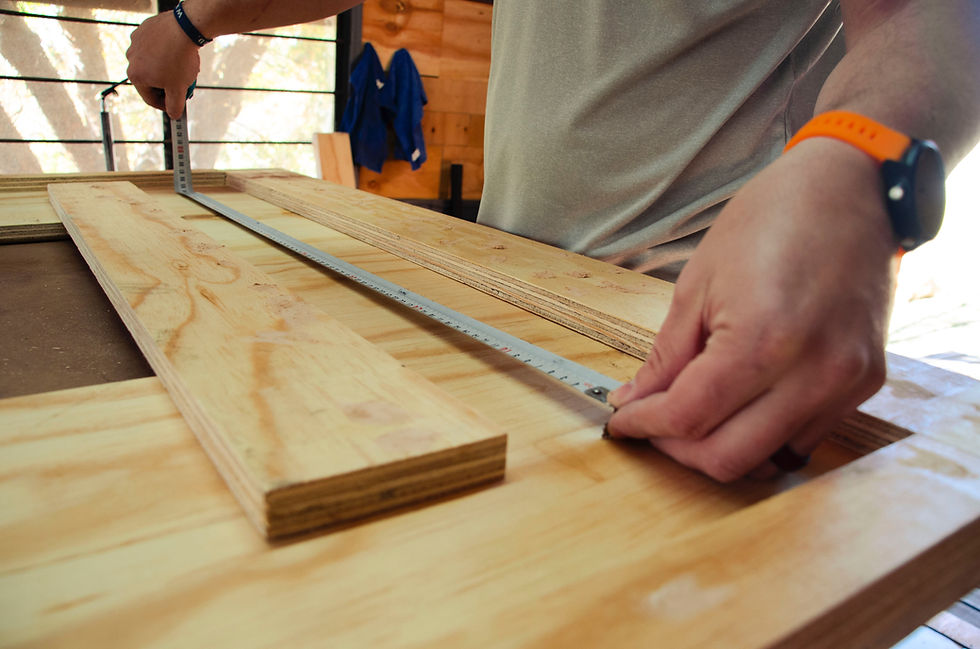Essential Skills Every Carpenter Should Master
- David Bierwirth

- Oct 28, 2025
- 3 min read
Thinking about a career in carpentry?
Good. Because carpentry isn’t just about hammering nails or cutting boards — it’s about shaping something real with your hands. It’s part art, part science, and 100% rewarding if you’ve got patience and grit.
Whether you’re fresh out of school, changing careers, or just curious about the trades, learning what it really takes to become a carpenter can set you up for long-term success.

Carpenter sanding a project.
The Skill Set That Builds Everything
Carpenters don’t just build walls and roofs — they build confidence, craftsmanship, and careers. But it’s not for the faint of heart. It takes skill, focus, and a love of hard work.
Here’s what every great carpenter brings to the table:
Technical know-how: Tools are your best friends — and sometimes your test of patience. Learn how to handle everything from a hand saw to a power drill safely and efficiently.
Math skills: Measurements matter. If you’re off by even a hair, you’ll feel it.
Strength and stamina: Carpentry is physical work. You’ll lift, bend, climb, and sweat — but that’s part of the satisfaction.
Problem-solving: Not every project goes smoothly. Warped wood, bad weather, and changing plans will test your creativity.
Teamwork and communication: You’ll work with builders, electricians, and clients. Communication keeps everyone safe and on the same page.
Patience: Some days you’ll rebuild the same thing twice. Take a breath — precision takes time.

Reviewing Blueprints.
How to Build Your Skills
Nobody becomes a carpenter overnight. You build your skills just like you build a project — one piece at a time.
Start small.
Practice with simple projects: a birdhouse, a stool, or a small table. The goal isn’t perfection — it’s progress.
Learn from pros.
Look for apprenticeship programs or local trade schools where you can train alongside experienced carpenters. Their lessons — and mistakes — are gold.
Stay safe.
Wear your goggles, gloves, and ear protection. Every seasoned carpenter knows someone who skipped safety once and regretted it.
Brush up on math.
Fractions, geometry, and angles will become second nature. Don’t worry — practice makes it click.
Keep your space organized.
A clean, tidy shop isn’t just easier to work in — it’s safer and faster.
Ask for feedback.
The best carpenters never stop learning. Take advice seriously, not personally.

Measure three times, cut once.
Why It’s Worth the Effort
Here’s why mastering these skills matters — beyond the paycheck.
Strong job demand: Skilled carpenters are needed everywhere, from homes to hospitals.
Solid income: The more you know, the more you earn.
Visible results: You get to see what your work creates, day after day.
Career growth: With experience, you can become a foreman, project manager, or even run your own shop.
Pride and purpose: Few things beat the feeling of standing back and
saying, “I built that.”
Carpentry rewards effort, not shortcuts. It’s about doing things the right way — and knowing your work matters.
Take the First Step Toward a Career in Carpentry
Ready to start? Here’s how to move forward:
Research local training or apprenticeship programs in your area.
Gather a few basic tools — hammer, tape measure, and saw — and start practicing.
Follow My Work My Future for stories, resources, and inspiration from others in the trades.
Every expert started with a first cut.
Make yours today.







Comments